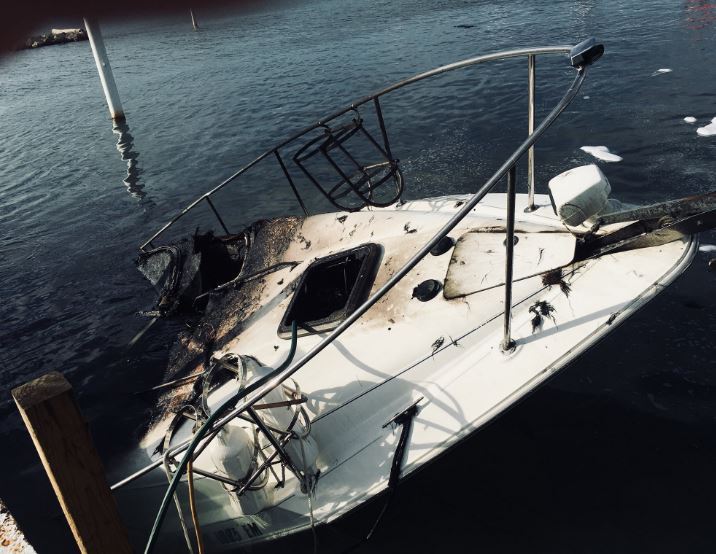We could sit for hours listening to all the heartbreak stories of boating misadventure, irresponsibility, stupidity, and disaster – though passing on the human tragedy thanks – recounted by marine insurance companies.
It’s not so much a matter of schadenfreude, that perverse sense of pleasure derived from another person’s misfortune, as a there-by-the-grace-of-god-go-I hope that we might learn from other boater’s mistakes.
Here are the top five causes of boating insurance claims at Pantaenius and a line or two about how you might avoid and/or prepare for them.
1. Poor Education in Navigation: Despite all the technology at our fingertips, there are still plenty of serious groundings around the world, in Australia, on the Great Barrier Reef, even at places like Port Stephens, as a result of misplaced faith in modern navigation equipment. While navigation has become a push-button affair, there remains a strong case for carrying paper charts and plotting a route with a pencil. This way you can avoid hazards, reefs, offshore islands and so on, while tracking your whereabouts at sea.
One claimant ran aground on the GBR in 2016 after creating a route on his GPS plotter, setting the autopilot and heading off to the galley. The problem was that he perfomed his route-making on a large-scale electronic map; it wasn’t until he zoomed in that the reefs he ran aground on could be seen. In another case, a cruising yachtie ran aground in Indonesia because the electronic chart was inaccurate and showed the channel through the reef was 20 metres away, as subsequent surveys revealed. Which is to say nothing of the 20,000 whales migrating annually along the Easstern Seaboard and all those lost shipping containers.
Maintaining a watch, using reliable charts and not leaving everything in the hands of an autopilot is still good advice. Cruising in company via boating clubs, branded regattas and rendezvous, and navigation time trials, are all a great proving and learning ground for your piloting skills.
2. Lack of Maintenance: From broken moorings, snapped tackle and blocks, to failed skin fittings, leaking stern glands and flat batteries from overworked bilge pumps, maintenance or lack thereof is one of the biggest causes of sinking and subsequent insurance claims. Don’t skimp on servicing and lift your boat annually to have all the seacocks, ball valves, skin fittings, anodes and more serviced. Standing yacht rigging is no less demanding. Check your boat routinely and use it often. Insurance claims due to lack of maintenance are too common, preventable and are usually rejected.
3. Irresponsibility: We’ve all heard of the drunk driver at the helm careening into boats at anchor after a skin full. If there’s a positive breath test, your insurance is null and void. If there’s injury worse is to come. Heading into the Silly Season, it’s essential to not drink and drive. If you want to have a few, employ a skipper.
New Years Eve often brings a minefield of claims, sometimes from others boats drifting into you. Avoid moving at night unless you have to (due to weather). Know how to anchor, check the forecast, and get set for a night aboard. Don’t push your luck fishing offshore. And play it safe in respect of speed. Remember, you’re the skipper and you’re responsible for your boat and crew. Keep everyone safe and comfortable and you minimise the risk.
4. Sub-Standard Repairs: While lightning causes terrific damage to boats, which usually haven’t a discontinuous break in their onboard electric systems, electrical issues and fires due to shoddy workmanship are a more common cause of insurance claims. Slack tradies are being caught out after sub-standard repair work. As a consumer, you have rights. But right up front, ensure a licenced electrician is working on your boat, as required by safety standards and insurance companies.
Marine Safety Queensland has a Marine Information Bulletin on Electrical Standards and Licences that reminds boat owners that they must engage the services of an electrical contractor for any mains voltage (230V or 240V) work on their boats. But it also includes that requirement for maintenance and repairs to low voltage electrical installations on boats.
Low voltage electrical installations and electrical equipment on boats must comply with the requirements of the Electrical Safety Act 2002 (ESA). The ESA provides that only licensed electricians may perform electrical work. A licensed electrician must ensure that electrical work is in accordance with Australian/New Zealand Standard 3000 known as the wiring rules (AS/NZS 3000). Beware: even 12V can kill.
5. Misadventure: As long as the tide floods in and ebbs again, accidents do and will happen. This is a fact of life. Hopefully, it’s not a cause of death. Good seamanship is all about minimising risk. Common sense is required when boating, but there is also a lot you can do to prevent catastrophe. Besides wearing a lifejacket, you should create a ‘grab bag’ of safety items that you can easily access in the event of misadventure, an accident, grounding, holing, abandon ship order, fire and so on. You can buy safety grab kits or make one yourself with the required safety gear and an EPIRB. Before a passage somewhere, discuss escape plans, muster points and what-ifs with your crew. If everyone has some idea of what to do in an emergency, you stand a much better chance of collecting your insurance payout rather than passing on your inheritance.
– David Lockwood


Comentarios recientes